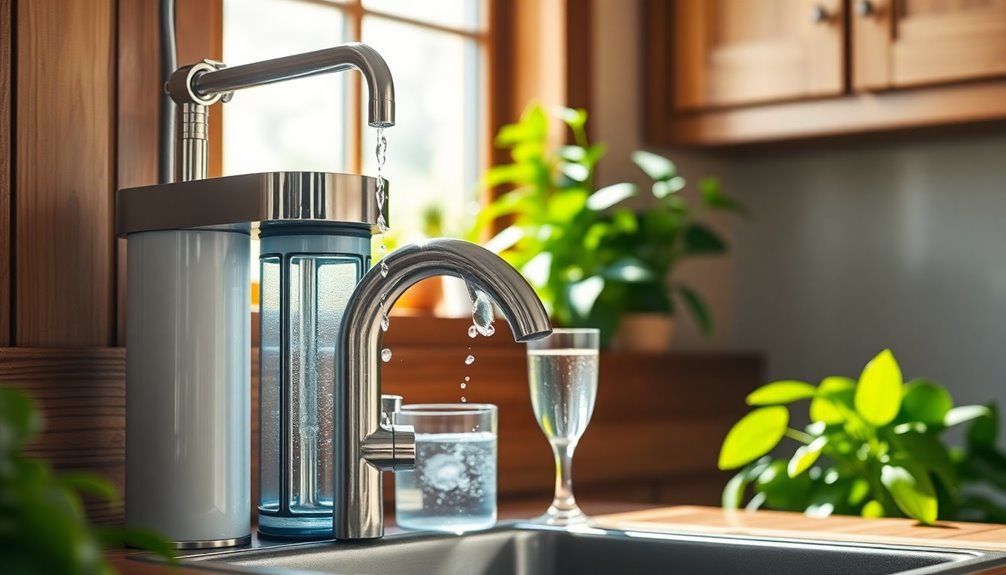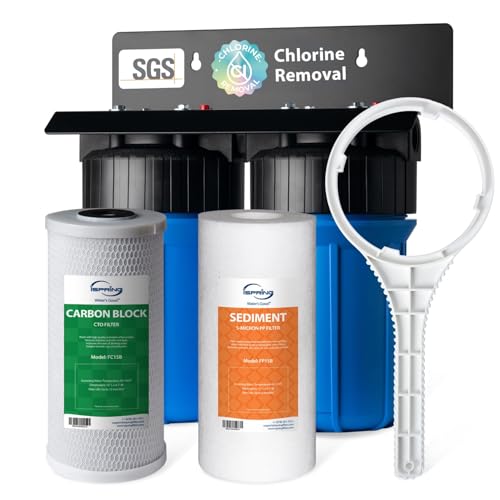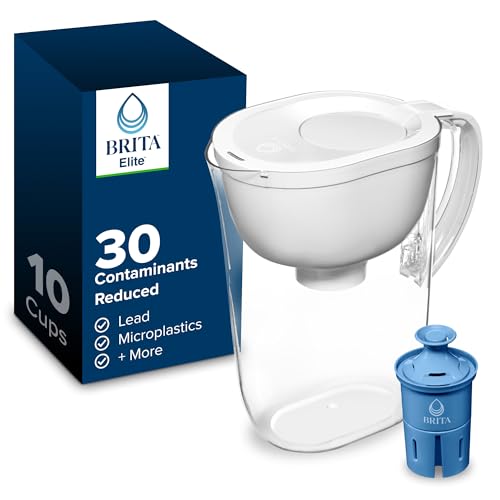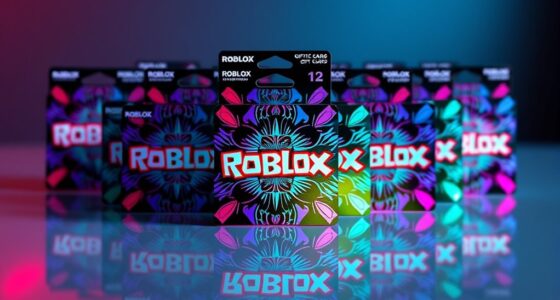When I was choosing a water filter for well water, I found several top contenders. The iSpring WGB32B and Aquasana systems stood out for their thorough filtration. For more compact needs, the Bluevua RO100ROPOT-LITE offers a portable solution. Also, the PUREPLUS and SimPure models are excellent whole house options. It's important to take into account factors like flow rate and maintenance for your specific situation. Stick around, and you'll discover more great options to keep your water clean and safe!
Key Takeaways
- Whole house systems like Aquasana and iSpring effectively remove contaminants while maintaining healthy minerals for comprehensive water filtration.
- Reverse osmosis systems, such as APEC and SimPure, offer advanced filtration, removing up to 99% of impurities for safe drinking water.
- Pitcher filters like ZeroWater and Brita provide a convenient option for treating smaller volumes of water at a low cost.
- Evaluate installation complexity and maintenance access to choose a system that fits your plumbing skills and long-term upkeep preferences.
- Look for certifications such as NSF/ANSI to ensure the system meets safety and effectiveness standards for drinking water filtration.
iSpring Whole House Water Filter System (Model: WGB32B)
If you're looking for a reliable solution to improve your well water quality, the iSpring Whole House Water Filter System (Model: WGB32B) might just be the perfect fit for you. This system reduces up to 99% of chlorine, sediments, and odors, using a 3-stage filtration process that includes coconut shell carbon. I love that it can handle up to 100,000 gallons while maintaining healthy minerals. The installation is a breeze, and the maintenance is straightforward with user-friendly cartridge replacements. Users rave about the softer water and clearer dishes, making this system a top choice for anyone concerned about their water quality.
Best For: Those seeking an effective and affordable whole house water filtration solution to improve water quality from both well and municipal sources.
Pros:
- Reduces up to 99% of chlorine, sediments, and odors for improved water quality.
- User-friendly installation and maintenance with easy-to-replace cartridges.
- Maintains healthy minerals while providing a significant capacity of 100,000 gallons.
Cons:
- Some users may need additional UV protection if installed outdoors.
- Requires periodic cartridge replacements, which adds to long-term maintenance costs.
- Initial setup may be challenging for those unfamiliar with plumbing systems.
Aquasana Whole House Well Water Filter System
The Aquasana Whole House Well Water Filter System is an excellent choice for homeowners looking to guarantee clean, safe water throughout their entire house. I appreciate its dual tank design, which enhances water contact time with filtration media, effectively removing 99.99% of bacteria and viruses. It also features a salt-free descaler that prevents scale buildup while retaining essential minerals. Installation is straightforward, thanks to the included kit, but I recommend professional help if you're not comfortable with plumbing. Overall, I've noticed a significant improvement in water quality, taste, and even my skin's health since installing this system.
Best For: Homeowners with well water seeking a comprehensive filtration system that ensures clean and safe water for drinking, cooking, and bathing.
Pros:
- Effectively removes 99.99% of bacteria and viruses, ensuring high water quality.
- Features a salt-free descaler that prevents scale buildup while maintaining essential minerals.
- Easy installation with included kit and quick filter replacements every two months.
Cons:
- Some users report mixed experiences with customer service, including issues with instructions and plumbing leaks.
- The salt-free descaler may not adequately replace a traditional water softener for homes with high mineral content.
- Regular maintenance and filter replacement costs should be considered in long-term budgeting.
Bluevua RO100ROPOT-LITE Countertop Reverse Osmosis Water Filter System
For anyone seeking a convenient and effective solution to purify well water, the Bluevua RO100ROPOT-LITE Countertop Reverse Osmosis Water Filter System stands out as an excellent choice. With its 5-stage purification process, this compact system easily fits on my counter. I love that it requires no installation—just plug it in! The smart LED display keeps me informed about the filter's lifespan and water quality. Plus, the taste of the water is noticeably better, making hydration enjoyable. I appreciate the savings compared to bottled water, and overall, I highly recommend this system for its performance and affordability.
Best For: Individuals or small households seeking a compact, user-friendly water purification solution without the need for installation.
Pros:
- Easy to use: No installation required; just plug it in and start filtering.
- Improved water taste: Significant enhancement in water flavor, encouraging better hydration.
- Cost-effective: Saves money compared to purchasing bottled water.
Cons:
- Brine water disposal: Requires proper disposal of waste water, which may be inconvenient for some users.
- Limited capacity: Designed for 1-2 people, may not be suitable for larger households.
- Dependence on electricity: Requires a power outlet to operate, which may limit placement options.
Aquasana Whole House Water Filter System (EQ-1000-AST-UV)
Offering robust filtration capabilities, the Aquasana Whole House Water Filter System (EQ-1000-AST-UV) stands out as an excellent choice for families reliant on well water. It removes 97% of chlorine and tackles organic chemicals effectively, providing clean water for under $0.01 per gallon. I found that installation can be smooth with proper planning, though some users faced leaks with plastic connections. While many praised the improved water taste and quality, some noted ongoing issues with sediment and earthy smells. If hardness remains a concern, consider additional softening solutions for best results. Overall, it's a solid investment for cleaner water.
Best For: Families relying on well water who want to improve water quality and reduce chlorine levels.
Pros:
- Effective filtration removes 97% of chlorine and organic chemicals, enhancing water taste and quality.
- Cost-efficient operation provides clean water for less than $0.01 per gallon, lasting up to 1 million gallons.
- Salt-free technology minimizes scale buildup while preserving beneficial minerals.
Cons:
- Installation challenges may arise, with reports of leaks from plastic connections and the need for additional parts.
- Performance as a softener is debated, with some users experiencing dryness and hard water marks despite system use.
- Customer service issues reported, particularly concerning warranty claims for DIY installations and product reliability.
PUREPLUS Whole House Water Filter for Well Water
If you're struggling with high levels of iron and manganese in your well water, the PUREPLUS Whole House Water Filter could be the perfect solution. This filter offers extensive filtration, effectively removing impurities like sediment and heavy metals. With easy installation and whole-house coverage, it's designed to maintain a high flow rate, ensuring you have water pressure for multiple taps. Although user experiences vary, many appreciate the improved clarity and taste of their water. Just keep in mind that maintenance is straightforward, requiring simple filter cartridge replacements. Overall, it's a solid choice for those seeking cleaner well water.
Best For: Those with well water suffering from high levels of iron and manganese looking for an effective filtration solution.
Pros:
- Comprehensive Filtration: Effectively removes sediment, rust, and heavy metals, improving water quality.
- Easy Installation: Comes with all necessary tools and is designed for straightforward setup.
- High Flow Rate: Maintains optimal water pressure, allowing for simultaneous use across multiple taps.
Cons:
- Mixed User Feedback: Some customers report installation issues and leaks.
- Customer Service Variability: Experiences with responsiveness and issue resolution can vary widely.
- Effectiveness Concerns: A few users expressed dissatisfaction with the product's performance in reducing impurities.
iSpring WGB21B 2-Stage Whole House Water Filtration System
The iSpring WGB21B 2-Stage Whole House Water Filtration System stands out as an excellent choice for families relying on well water due to its impressive filtration capacity of up to 50,000 gallons. This system utilizes a 5-micron sediment filter to catch dirt and rust, and a CTO filter that removes over 90% of chlorine and harmful VOCs. I appreciate how easy it is to install, thanks to the pre-assembled design and included filter wrench. Plus, it retains healthy minerals, unlike RO systems. With great customer support and a solid warranty, I find this system a reliable option for clean water.
Best For: Families relying on well water who want an effective and easy-to-install filtration system that retains healthy minerals.
Pros:
- Easy DIY installation with pre-assembled design and included tools.
- Effective filtration that removes dirt, rust, chlorine, and harmful VOCs.
- Excellent customer support and a solid warranty for peace of mind.
Cons:
- Does not remove Total Dissolved Solids (TDS), which may be a drawback for some users.
- Requires regular filter changes to maintain optimal performance.
- Initial investment cost may be higher compared to basic filtration options.
PRO+AQUA Elite Series GEN2 PRO-100-E Whole House Water Filtration System
For small to medium households with 1-3 bathrooms, the PRO+AQUA Elite Series GEN2 PRO-100-E Whole House Water Filtration System stands out as an excellent choice. This 3-stage system effectively filters both city and well water without the hassle of regeneration or electricity. It captures sediments, reduces heavy metals, and eliminates odors, ensuring clean, great-tasting water. Installation is straightforward, though professional help might be wise for plumbing needs. I've noticed improved water quality and a reduction in bottled water usage. Plus, with a 5-year warranty and responsive customer support, I feel confident in my purchase.
Best For: Small to medium households with 1-3 bathrooms looking for an effective and low-maintenance water filtration system.
Pros:
- Easy installation without the need for electricity or regeneration.
- Significant improvements in water taste and quality, leading to reduced bottled water usage.
- Strong customer support with a 5-year warranty and a 30-day money-back guarantee.
Cons:
- Some users may require professional assistance for plumbing installation.
- Specific replacement filters must be sourced from the manufacturer, leading to potential inconvenience.
- Occasional issues reported with the sediment gauge accuracy.
APEC Water Systems ROES-50 Reverse Osmosis Drinking Water Filter System
Looking for an effective solution to filter well water? I recommend the APEC Water Systems ROES-50 Reverse Osmosis Drinking Water Filter System. This top-tier, 5-stage system removes up to 99% of impurities like arsenic, lead, and chlorine, ensuring your water's safety. Designed and assembled in the USA, it's known for its reliability and superior taste—better than bottled water! Installation is straightforward, even for beginners, and filter replacements are affordable. With high customer satisfaction, it's no wonder this system is highly rated. For clean, crisp drinking water, the APEC ROES-50 is a smart choice!
Best For: Those seeking a reliable and efficient water filtration system to ensure clean and safe drinking water from well sources.
Pros:
- Effectively removes up to 99% of impurities, including arsenic, lead, and chlorine, providing superior water quality.
- Easy installation process that can be managed by individuals with basic plumbing skills.
- Cost-effective long-term solution compared to bottled water delivery services, with reasonably priced filter replacements.
Cons:
- Initial setup requires some plumbing knowledge, which may be challenging for complete beginners.
- Filter replacements are necessary every 6 months to maintain optimal performance, adding ongoing maintenance costs.
- May require flushing the system before first use, which can be time-consuming for some users.
Brita Everyday Elite Water Filter Pitcher (10-Cup Capacity)
With its impressive ability to remove 99% of lead and other contaminants, the Brita Everyday Elite Water Filter Pitcher is perfect for anyone reliant on well water. I love its 10-cup capacity, which fills three reusable bottles, making it convenient for my family. The sleek design fits well in my fridge, and the SmartLight indicator keeps track of filter life, ensuring I always have fresh water. Plus, it's BPA-free and targets PFAS and microplastics. By switching to this pitcher, I've noticed a significant taste improvement and feel great about reducing plastic waste. It's a smart investment for health and the environment!
Best For: Individuals and families looking for an effective and eco-friendly solution to filter their drinking water, especially those relying on well water. These filters not only improve the taste and clarity of water but also reduce contaminants that may be present in well water. For those searching for the best water filter pitchers for families, these options provide a convenient and sustainable way to ensure clean drinking water. With features such as large capacity, easy handling, and quick filtration times, these pitchers are designed to accommodate the needs of busy households.
Pros:
- Advanced filtration removes 99% of lead, chlorine, and other contaminants for cleaner, better-tasting water.
- The 10-cup capacity allows for convenient filling of multiple reusable bottles, reducing plastic waste.
- Easy to use with a SmartLight indicator for tracking filter life and a sleek design that fits well in most refrigerators.
Cons:
- Some users report concerns about durability when the pitcher is full, requiring careful handling.
- Replacement filters may be difficult to find in certain regions, potentially hindering continued use.
- Weight distribution can feel uneven when the pitcher is full, making it less stable during pouring.
ZeroWater 32-Cup Water Filter Pitcher Dispenser
The ZeroWater 32-Cup Water Filter Pitcher Dispenser stands out for its ability to remove virtually all total dissolved solids (TDS), making it an ideal choice for anyone concerned about water quality, especially those relying on well water. I love that it features a 5-stage filtration system, drastically reducing TDS levels from my tap water to 0 ppm. The integrated TDS meter is a handy tool, letting me know when to replace the filter. Plus, it's eco-friendly, saving me from using over 600 plastic bottles annually. With its sleek design and large capacity, it's perfect for my family's needs!
Best For: Individuals and families seeking high-quality water filtration, especially in areas with high total dissolved solids or poor water quality.
Pros:
- Effective Filtration: The 5-stage system removes virtually all TDS, providing pure tasting water.
- Eco-Friendly: Saves up to 660 single-use plastic bottles annually, promoting sustainability.
- User-Friendly Design: Features a sleek design with a large capacity and easy-to-use pull lever for pouring.
Cons:
- Filter Lifespan: Filters may need to be replaced monthly, leading to ongoing costs.
- TDS Meter Sensitivity: Requires careful handling to avoid damage, which may be inconvenient for some users.
- Initial Filtering for Outdoor Use: Not suitable for muddy water without prior filtration, limiting outdoor applications.
SimPure Whole House Water Filter Housing (DB10P)
If you're in search of a reliable water filtration solution for your home, the SimPure Whole House Water Filter Housing (DB10P) stands out as an excellent choice. This unit is durable, made of reinforced polypropylene, and meets NSF standards for safety. Installation is straightforward with the included tools, and it accommodates standard 4.5" x 10" filter cartridges. I've noticed a significant improvement in water quality, with sediment removal being particularly effective. Be sure to have spare filters ready, as timely replacements are essential. Overall, it offers great performance and value, making it a smart investment for clean drinking water.
Best For: Homeowners seeking a reliable and efficient whole house water filtration system that improves water quality and ensures safe drinking water.
Pros:
- Durable construction from reinforced polypropylene that meets NSF standards for safety and chemical resistance.
- Easy installation process with included tools and compatibility with various filter brands.
- Significant improvement in water quality with effective sediment removal, maintaining water pressure.
Cons:
- Installation may require additional hardware for wall mounting as screws are not included.
- Potential for leaks if not installed correctly, necessitating careful attention to fittings and sealant.
- No pre-installed filter, requiring separate purchase and timely management of filter replacements.
SimPure Q3-600 Tankless Reverse Osmosis System
For anyone seeking a reliable solution to purify well water, the SimPure Q3-600 Tankless Reverse Osmosis System stands out with its impressive 7-stage filtration process. It removes 99.99% of over 1,000 contaminants, ensuring tasteless, clean water. With a flow rate of 600 GPD, I can fill a glass in under 12 seconds! Installation took me about 30 minutes, and I appreciated the compact design. Plus, the 2:1 pure to drain ratio saves water, making it eco-friendly. Overall, it's exceeded my expectations, and I highly recommend it for anyone wanting quality drinking water without the hassle of heavy jugs.
Best For: Individuals and families seeking a high-quality, tankless water purification system that efficiently removes a wide range of contaminants from their drinking water.
Pros:
- 7-stage filtration removes 99.99% of over 1,000 contaminants, ensuring clean and tasteless water.
- High flow rate of 600 GPD allows for quick filling of glasses and large containers.
- Eco-friendly design with a 2:1 pure to drain ratio saves water compared to traditional systems.
Cons:
- Potential installation challenges if power outlets are controlled by garbage disposal switches.
- Occasional reports of leaking 3-way valves, requiring replacements.
- Users should verify power source compatibility to avoid installation issues.
SimPure Whole House Water Filter System (DB10C-2)
Offering a robust 2-stage filtration system, the SimPure Whole House Water Filter System (DB10C-2) stands out as an ideal choice for homeowners relying on well water. Its combination of carbon and sediment filters effectively reduces total dissolved solids, making your water cleaner and safer. I appreciated the clear housing that lets me monitor filter usage easily. Installation was a breeze, taking me less than 30 minutes. However, I did have to verify the mounting was secure due to its weight. While some users reported minor leaks, using quality sealing materials seemed to help. Overall, it's a solid investment for clean water.
Best For: Homeowners relying on well water who seek an effective and user-friendly filtration system.
Pros:
- Easy installation, often completed in under 30 minutes.
- Clear housing allows for easy monitoring of filter usage.
- Significant reduction in total dissolved solids (TDS), improving water quality.
Cons:
- Some users reported leaks at fittings, requiring careful sealing.
- Concerns about the durability of plastic canisters, with potential for cracking.
- Metal frames may rust after a short installation period.
Waterdrop Spin Down Sediment Filter for Whole House Water Filter System
The Waterdrop Spin Down Sediment Filter is an excellent choice for homeowners seeking reliable filtration for well water. With options for 50 and 200 Micron filter mesh, it effectively removes rust, sand, and sediment, protecting my pipes and appliances. Its high flow rate of 20 GPM and durable design guarantee it meets various water quality needs. I appreciate the reverse flush cleaning mechanism, making maintenance a breeze. Plus, the BPA-free materials and corrosion-resistant fittings provide added safety. Installation is straightforward, and it fits seamlessly into any system, making it a versatile addition to my home's water filtration setup.
Best For: Homeowners seeking a reliable and efficient sediment filtration system for their water supply, especially those using well water.
Pros:
- Effective filtration with options for 50 and 200 Micron mesh to remove rust, sand, and sediment.
- Easy maintenance thanks to the reverse flush cleaning mechanism.
- Simple installation with versatile fittings for various water filtration systems.
Cons:
- May be inadequate for larger homes exceeding 2300 square feet.
- Not recommended for outdoor installation in low temperatures.
- Some users may require additional filters for enhanced purification.
EXPRESS WATER 3-Stage Heavy Metal Water Filtration System
If you're looking for a reliable filtration solution to tackle heavy metals like lead and mercury in your well water, the Express Water 3-Stage Heavy Metal Water Filtration System stands out. This system effectively eliminates contaminants, providing you with odor-free, crystal-clear water. I found the installation straightforward, and I noticed a significant improvement in water clarity and taste almost immediately. With durable stainless steel construction and a lifespan of up to 100K gallons, it's a solid investment. Plus, the customer support is responsive, making it easy to maintain. I highly recommend this system for anyone serious about water quality!
Best For: Individuals and families concerned about heavy metal contamination in their drinking water, particularly those using well or municipal water sources.
Pros:
- Comprehensive filtration effectively removes heavy metals, chlorine, and other impurities from water.
- Durable construction with stainless steel materials ensures longevity and reliability of the system.
- Responsive customer support provides quick assistance and replacement parts when needed.
Cons:
- Initial cost may be a consideration for some, despite being lower than comparable systems.
- Regular filter replacements every 6 months are necessary to maintain optimal performance.
- Installation may require professional help for those unfamiliar with plumbing systems.
Factors to Consider When Choosing a Water Filter for Well Water
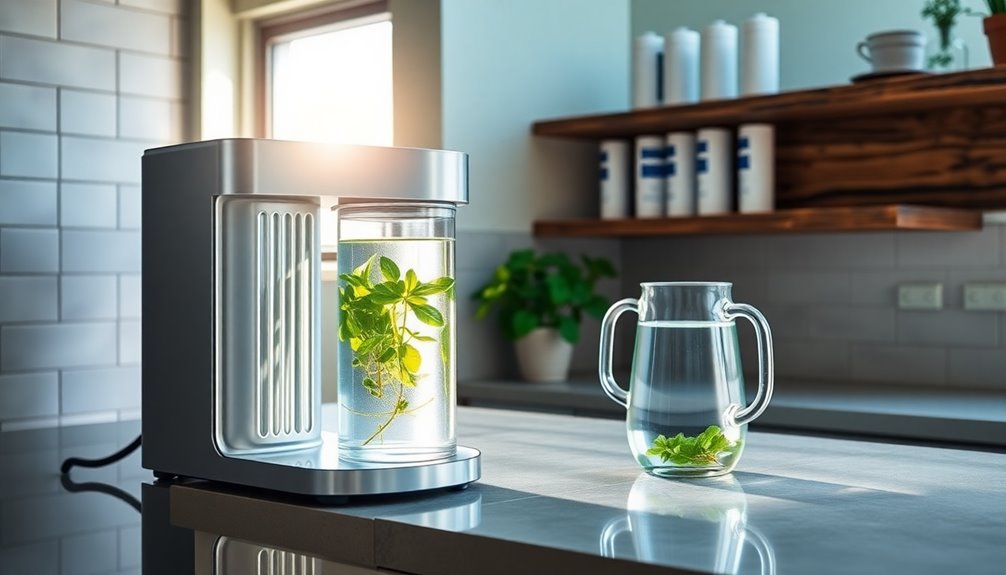
When choosing a water filter for well water, I always consider several key factors. Contaminant removal efficiency, filter lifespan, and installation complexity can really impact my decision. Plus, I look at the water flow rate and overall cost-effectiveness to guarantee I'm getting the best value.
Contaminant Removal Efficiency
Choosing the right water filter for well water hinges on understanding its contaminant removal efficiency. I've found that this efficiency can vary considerably depending on the filtration technology, like activated carbon or reverse osmosis. Many filters target heavy metals, bacteria, and sediment, with some systems capable of removing up to 99.99% of harmful pathogens when properly tested. It's essential to select a filter that addresses the specific contaminants often found in well water, such as iron, manganese, and nitrates. I also recommend looking for filters that have been independently tested against NSF/ANSI standards to guarantee they meet safety benchmarks. Remember, regular maintenance and timely cartridge replacement are critical to keeping the filter's performance at its peak.
Filter Lifespan and Maintenance
Understanding filter lifespan and maintenance is essential for ensuring your well water stays clean and safe. Different filters have varying lifespans; for instance, carbon and sediment filters often need replacing every 6 to 12 months. Regular maintenance is key for peak performance, and many systems feature user-friendly elements like pressure relief valves or quick-change cartridges that make filter changes easier. If your well water has high sediment or contaminants, you might find yourself replacing filters more frequently. It's important to monitor water quality and flow rate—if you notice a drop in pressure, it's likely time for a change. Staying on top of maintenance will help keep your water pristine and protect your health.
System Installation Complexity
Installing a water filter system for well water can be straightforward or quite complex, depending on the specific model you select. I always assess the installation requirements first. Some systems require advanced plumbing skills, while others are perfect for DIY enthusiasts. It's essential to check compatibility with your existing plumbing—pipe sizes and materials can make a difference. I also evaluate the tools and materials needed; some systems include everything, while others may need extra purchases that can add to costs. Reviewing user manuals helps me understand installation clarity and time commitment. Finally, I consider long-term maintenance access, as systems that allow easy filter changes save me time and effort in the future.
Water Flow Rate
When it comes to filtering well water, the flow rate is a significant factor that can make or break your experience. Measured in gallons per minute (GPM), the flow rate indicates how much water your filter can deliver at once. For larger households or homes with multiple bathrooms, a higher flow rate—around 15 GPM—is necessary to meet peak demands without sacrificing water pressure. It's important to match the flow rate of your filtration system with your household's needs to guarantee consistent water quality. If you live in a smaller home or apartment, a lower flow rate might suffice. Always consider the system's ability to handle contaminants while maintaining its desired flow rate.
Cost-Effectiveness and Value
Choosing the right water filter for well water involves more than just considering the flow rate; cost-effectiveness and value play a significant role in your decision. When evaluating options, don't just look at the initial price—factor in long-term maintenance costs, like filter replacements and any plumbing changes. Systems with high filtration capacities, treating up to 100,000 gallons or more, often provide better value over time. Also, consider how often you'll need to replace filters; some last only two months while others can last up to ten years. Calculating the cost per gallon of filtered water can reveal significant savings, especially when effective filtration reduces your reliance on bottled water. This can truly enhance your overall cost-effectiveness.
Certifications and Standards Compliance
While considering a water filter for well water, it's vital to focus on certifications and standards compliance to confirm you're making a safe choice. Look for filters that have NSF/ANSI 53 or 58 certifications; these indicate they effectively reduce contaminants like heavy metals, bacteria, and viruses. Additionally, systems meeting NSF/ANSI Standard 55 can sterilize harmful microorganisms, guaranteeing safe drinking water. Certifications from the Water Quality Association (WQA) assure you of a filter's reliability in removing specific well water contaminants. It's also essential to verify the filter complies with EPA drinking water standards and meets local regulations, as these can vary based on your well water's specific contaminants. Prioritizing these certifications will help you choose wisely.
Frequently Asked Questions
How Often Should I Replace My Well Water Filter?
I've found that replacing my well water filter every six months keeps my water clean and safe. However, it really depends on my water quality and usage. If I notice any changes in taste or clarity, I'll check the filter sooner. Regular maintenance helps prevent any buildup that could affect my drinking water. Trust me, staying proactive about filter replacement makes a big difference in the quality of water I enjoy every day.
Can I Install a Water Filter Myself?
Absolutely, I can install a water filter myself! I've done it before, and it's usually a straightforward process. I just gather the necessary tools, read the instructions carefully, and follow the steps. It helps to turn off the water supply first, then attach the filter according to the guidelines. If I run into any complications, I can always look up tutorials or ask for help. It's definitely doable!
What Contaminants Do Well Water Filters Remove?
When I think about well water, I'm reminded of those old tales where the purest springs could heal ailments. Yet, not all well water is pristine. Filters can remove contaminants like bacteria, heavy metals, and sediments, ensuring our drinking water's safety. I've found that they also tackle chemicals like chlorine and pesticides, which might lurk unnoticed. So, if you're considering a filter, think about the peace of mind it can bring!
Are There Maintenance Requirements for Well Water Filters?
Absolutely, well water filters do have maintenance requirements. I've learned that regular filter changes are essential to keep everything running smoothly. Depending on your filter type, I found it helpful to check and replace cartridges every few months. Also, I inspect the system for any leaks or clogs. Cleaning and sanitizing the components periodically keeps them in top shape. Taking these steps guarantees that my water stays safe and clean.
How Do I Know Which Filter Is Best for My Well Water?
When I'm trying to figure out which filter is best for my well water, I first test the water to identify contaminants. I look for filters that specifically target those issues, like heavy metals or bacteria. I also check reviews and ratings from others who have similar needs. Finally, I consider the filter's maintenance requirements and the cost of replacement parts to guarantee it fits my lifestyle and budget.
Conclusion
In my journey to clean, safe drinking water, I've discovered that selecting the right water filter for well water is essential. With so many fabulous options, finding the perfect fit can feel intimidating. However, by focusing on factors like filtration features, flow rate, and maintenance, you can make a wise choice. Remember, prioritizing purity not only protects your health but also enhances your home. So, immerse yourself in your decision and guarantee your water's wellness!
